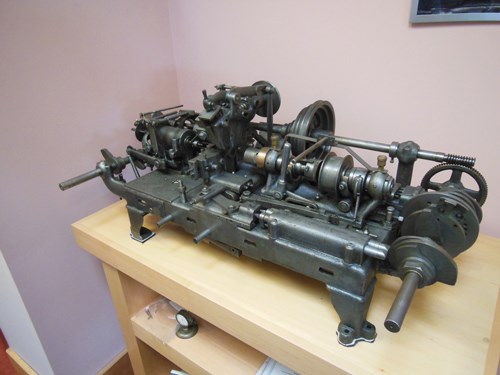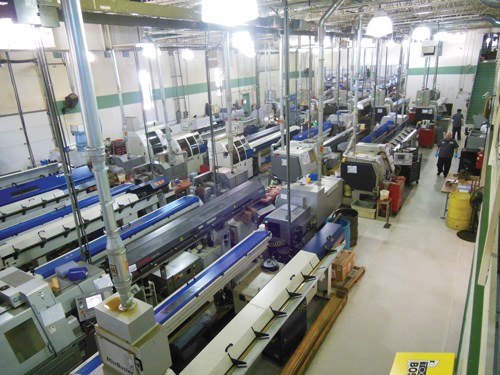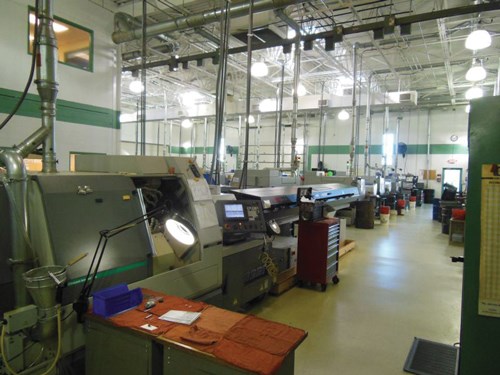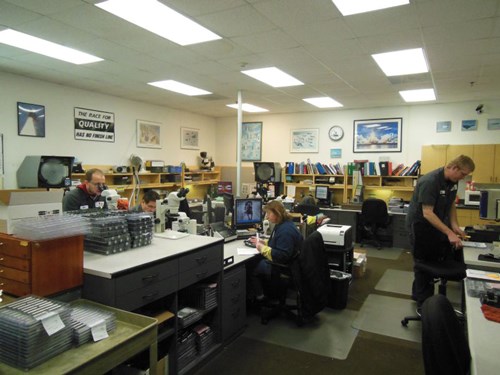A Swiss Shop’s Next Generation
The shallow talent pool of available skilled machinists can be an even bigger obstacle to the shop that is rapidly growing. Perhaps the best solution is to attack the problem from within.
Any shop that has been in search of a talented operator in recent years has likely faced stiff challenges in filling the void. Our industry has struggled to keep pace in training qualified machinists while well seasoned veterans either move higher in the management chain or out of the industry entirely. While some people force practical discussions about if the root of the problem stems from our country’s educational system, from media’s less-than-glamorous portrayal of factory jobs, the threat of lost jobs because of manufacturing work moving overseas, or some other highly possible cause, others are getting their hands dirty developing solutions.
Most everyone in the industry admits that we have a problem, so we’re happy to see organizations such as the National Institute for Metalworking Skills (NIMS) and ToolingU assembled for the specific purpose of helping to develop a globally competitive American workforce. Companies frequently contribute to the effort by donating time and equipment to vocational schools and other institutions that are regrouping to train the next generation of shopfloor personnel. These types of large-scale ventures are necessary steps in the right direction toward long-term resolution. But what about the shop that needs to hire someone today to fulfill a customer’s immediate need?
Swiss Automation Inc. (Barrington, Ill.) has adapted its hiring procedures to handle such situations. This company knows all about customer demands and has built a very successful growth plan based on the desire to tackle every opportunity that it is presented.
Rapid Growth
Company President Ken Malo began his business in 1965 in a small store front in Chicago with four Tornos cam machines. He eventually relocated to Barrington, first into an industrial building that included a studio apartment where he lived, and then in 1998 to the company’s current location. In 2006, the company added on to its existing building, and in 2010 purchased a second facility a few miles down the road. Today the company’s two facilities, totaling almost 80,000 square feet, do about $30 million in business annually.
The majority of the work produced at Swiss Automation is for hydraulics, but being a job shop, the company doesn’t hesitate to take any work that will run on its machines. Foreman Marc Moran says, “We’ll run anything from medical to aerospace to connectors. Weaponry has been hot lately, so we’ve been getting more into that.”
The company has traditionally been a Swiss house while also running parts up to 2 inches in diameter on an extensive lineup of Tornos Deco and Citizen machines. It has also maintained the occasional fixed headstock machines, including a recently added Nakamura, plus two Eurotechs and two Miyanos. “Some of our customers are starting to request bigger part diameters, so we made the decision to expand our capabilities,” Mr. Moran says. That’s really been the driving force behind the majority of the company’s expansion—doing whatever it takes to meet customer demands as efficiently as possible. “We had one job that was such high volume that it was running on four or five machines full time,” Mr. Moran says. “We bought a Deco multi-spindle that now is dedicated to that single part. We keep in close touch with customer demands, and if the machines that we have can’t handle the work or are booked too far into the future to deliver, we don’t hesitate to bring in something new.”
Between its two facilities, the company has about 120 machines, including the 30 that were added in 2010 to equip the new building as well as the 12 machines added since then. But of course, with the steady addition of machine tools also comes the need for operators. Swiss Automation has created its own approach to dealing with the well known shortage of qualified machinists so it can man its machines with people who can confidently handle the work.
A Lot of Training
In 2010, Swiss Automation added 54 employees and 36 more in 2012. While the company is certainly open to and interested in finding experienced machinists, it is not dependent on it. Donalle Zemanek, human resources manager, says, “It’s very hard to find skilled help. A lot of companies wait for the skilled help to come through the door, but they’re not coming. About nine out of ten people we bring in are entry level, and we train them ourselves.”
With the amount of hiring the company does, this seems like an overwhelming task. But Swiss Automation has a paid apprenticeship program in place that is built to cycle a steady stream of new employees through, adding valuable shopfloor personnel without losing production time.
“We hire regularly throughout the year, and we’re very conscious how many we bring in at one time to make sure nobody falls through the cracks and is forgotten,” Ms. Zemanek says. “We want a lot of one-on-one time during the early stages, so we try not to bring in more than two or three entry-level apprentices at a time.”
Almost all shopfloor employees start in inspection, regardless of the position they were hired to eventually fill. The first days on the job typically involve watching training DVDs and learning how to read blueprints, and then they learn the intricacies of checking parts. Each apprentice is partnered with a senior person in Quality Control who acts as a mentor and teaches various skills such as how to read a micrometer.
This early stage of the program can last roughly between 3 and 12 months. No formal timetable is applied; apprentices are encouraged to go at a comfortable pace and thoroughly learn what is in front of them. When they are ready, they take an apprenticeship test to verify that they are prepared to move on to the shop floor. There they will be partnered with a senior machinist who will begin the next stage of development—learning the operations of the machine.
As apprentices move out of inspection, they’re quickly replaced with others. “We typically bring in more people than we need, assuming some may leave or not work out,” Mr. Moran says. “Since we work three shifts here, it can be hard, especially with the night shift, to keep us manned. I always have a few extra people in the pipeline who are being trained. Of course, it raises the payroll, but you have to be prepared. If we lose someone and we’re busy, we can’t have machines just sitting idle.”
How it Started
The apprenticeship program at Swiss Automation has an interesting foundation. “I’m very supportive of training on the job because of the way I’ve progressed through the company,” Mr. Moran explains, who spearheaded the development of the program. “I started here 19 years ago in shipping and receiving and knew nothing about machining or any other aspects of the shop. I didn’t even know what a CNC machine was. But I pushed myself to learn, taking classes and asking a lot of questions. So I’ve always believed that everybody should have the same opportunity.”
Through the years, Mr. Moran has kept his eye out for people who want to learn and makes sure they have every opportunity to do so. Not only does it help the employees, but it makes the company stronger as well. “It seems that some companies sort of hold their employees back,” he says. “Some shopfloor people keep their knowledge to themselves because they are afraid they’ll get passed by if they show someone too much. But how is that going to make your business stronger? I learned a long time ago in high school football how important teamwork is to success.”
Ms. Zemanek adds, “We train from within and don’t hold anyone back. Every employee that comes in here has the opportunity to move up if they are willing to put the work in. Shipping, secondary, material handlers—if they want to move up, they can. And every person who has moved up the ranks has been successful. It really does work.”
For the people who Swiss Automation hires, attitude is more important than experience. “When I interview people,” Mr. Moran says, “I try to get a sense of their drive and determination. Do they seem interested in learning? Do they have common sense? Are their math skills adequate? Do their hobbies indicate that they are mechanically inclined? It’s more about what they potentially can do than what they have done.”
The Big Picture
Mr. Moran is a strong advocate of programs that help strengthen U.S. manufacturing. He feels something has been lost along the way, and the country is no longer the powerhouse it once was. And he’s not satisfied with that. “Too many people want things handed to them these days,” he says. “I worked hard to get where I am today, often spending many hours of my own time learning. Nobody held my hand. But look where it’s gotten me. That’s the attitude I like to see in our employees, and that’s the attitude we need throughout the industry to bring it back to where we once were.”
Swiss Automation tries to do its part in changing attitudes and educating young people about work in manufacturing. Beyond its own apprenticeship program, the company has also teamed with several area high schools and colleges, bringing students in to work part-time as interns while they earn school credit. “Right now, we have a part-time intern, from Harper College in Palatine, who will be with us for 13 weeks,” Ms. Zemanek says. “The school has partnered with 13 other schools in Illinois to teach precision machining and manufacturing in general.”
“Sometimes we have high school students work here during the summer,” Mr. Moran says. “We had some from Addison Trail High School last year, and they were upset because the school was running low on funds and considering eliminating the machining classes. As an industry, we need to do everything in our power to support these programs—build them instead of watching them fade away. We donated a lot of our bar ends to the school to help out, and now other schools contact us with similar requests.”
The company doesn’t hesitate to help out where it can. Mr. Moran sees it as an important role in keeping manufacturing in the U.S. It has also, clearly, been beneficial to Swiss Automation, as the local workforce is strengthened. “The more we promote manufacturing in our immediate area, the more it helps our business,” he says. “We get our name out there, and we try to help the kids so they can have a bright future. And perhaps they’ll work for us some day.”
Mr. Moran is pleased with the contributions Swiss Automation continues to make in developing the manufacturing workforce and is happy with his own employees. “The young ones keep learning as long as we keep feeding them information. That’s only going to make us better and stronger.” He admits that the company assumes some risk with the investment it makes in personnel. “You’ll probably lose some of them, and of course, that’s not ideal,” he explains. “But the ones we develop and keep make it worthwhile in the big picture. As long as we make it a good company with regular wage reviews while ensuring it’s a fun place to work, they’re likely to stay.”
— Marubeni Citizen-Cincom Inc.
Related Content
Shop Optimizes its Swiss-Turning Flexibility
Paramount Machine uses various Swiss-type lathes, some with a B axis, to produce parts more effectively than it did on conventional chucker lathes. Today, nearly every job under 1.5 inches in diameter runs across those machines even if the batch size is a mere 5 pieces.
Read MoreShop Sets its Sights on Precise Tool Alignment
A Wisconsin shop has found that visual tool alignment technology has improved tool life and surface finishes for its Swiss-type lathes while increasing throughput as well.
Read MoreDoes a Scanning Probe Make Sense on a Swiss-Type?
Swiss-types have limited tooling capacity, but there can be advantages to giving up some of that capacity to take advantage of a touch probe — in fact, a scanning probe — to enable in-process part measurements.
Read MoreStories of Swiss First Additions
A handful of shops share their stories about the how’s and why’s of adding their first Swiss-type CNC turning centers.
Read MoreRead Next
Training For Now And The Future
Online learning tools are quickly becoming a standard for many shops looking to maintain a high level of continuing education while keeping expenses at a minimum.
Read MoreDo You Have Single Points of Failure?
Plans need to be in place before a catastrophic event occurs.
Read MoreEmerging Leaders Nominations Now Open
Here’s your chance to highlight a young person in your manufacturing business who is on the path to be a future leader moving your company forward.
Read More



























